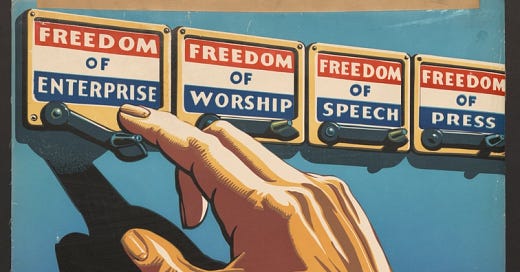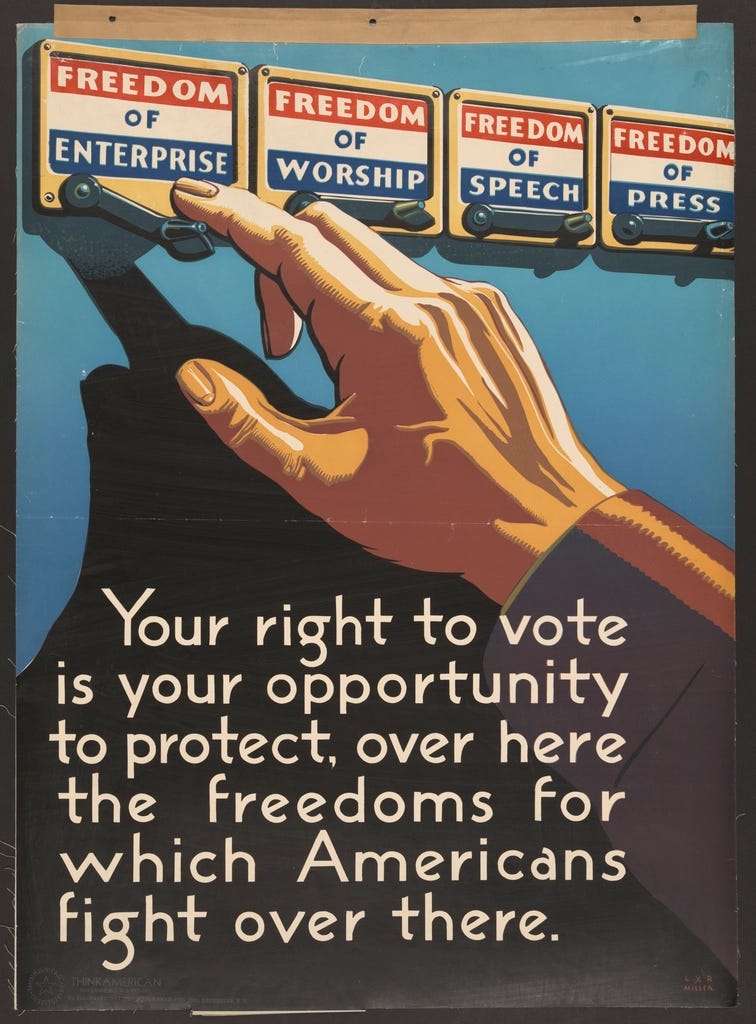On Election Day 2024
Predictions and voting intentions for the November 5, 2024 United States national election and a challenge to those who want to get better at predicting the future.
Dear Friends,
In 2016, I bet money that Trump would beat Clinton. Serving as Chair of the Libertarian National Committee during the Gary Johnson / Bill Weld presidential campaign gave me lots of information from all around the country and showed a clear path for a Trump upset. Leveraging that information to wager on the election made me a little over $1,000 while keeping me honest about my reasoning.
Campaigns for public office are all about telling stories. Some stories are about the candidate, what shaped them, what experiences have they had that they share with a group of voters, what they plan to do to solve the important issues that face the district. Some stories are about the opponent, what warped them, what fringe groups are they a part of that repels a group of voters, how they plan to line their pockets while dismantling the progress that we’ve made on solving important issues that threaten the district. Some stories are about the voters, who they aspire to be, what values they cherish that are reflected in only one of the candidates, and what they want the district to look like at the end of a term in the office.
When you’re good at telling the stories, people believe them. A good story told to people with agency can make itself true, can be formed from the actions of people who believe it and want it to be true. The 2008 “Hope” campaign was one of those kind of stories, one that was embraced in such numbers that it became a snowball rolling downhill in an avalanche of votes from people who usually don’t bother to vote or have never voted.
Incidentally, turning out a non-voter is the hardest trick in political technology. It’s way easier to get a person to repeat a habit, to remind a person to do the thing that they normally do anyway, than it is to get a person who doesn’t care to start to care. The pool of unlikely voters is massive, but very difficult to fish in.
Telling stories for a living carries a risk, the risk that you believe your own story. There are two ways to deal with this risk that I know, keep a sense of detachment from the story to immunize yourself from your own persuasion, or enthusiastically buy in to the story you’re telling to the point that you become a sincere evangelist for a truth you believe in. The latter breeds greater success, at the cost of greater pain when you lose.
At the public defender’s office, we called this “trial psychosis,” the state of believing the story of the case that was best for your client, no matter how thin certain spots in the evidence were or how shifty some of the witnesses were, or the skeptical looks from the jurors. You just believed you were going to get every break in your favor, receive nothing but two-word verdicts at the end, and set your client free. Trial psychosis is an altered mental state that produces greater performance, at the cost of greater disappointment in failure.
It would be incredibly unethical to place a wager on the outcome of a criminal trial, but it’s not unethical to place a wager on the outcome of an election. Placing a wager on the outcome of an election is a good way to test whether you can still tell what is likely to happen at the same time as spending time and money to tell a story about what you want to make happen. If you’re right, you win money. If you’re wrong, you lose money. If you make your bets public, other people know your track record with objective performance tests.
In 2020, I bet money that Biden would beat Trump. In addition to working on statewide campaigns across the country, I was also advising consulting clients on where to make impactful political investments on behalf of Libertarian Party candidates for public office. Leveraging that information to wager on the election won me thousands of dollars in bets, though a few MAGA people deleted their social media accounts and disappeared in order to avoid paying off. It kept me honest about whether working on campaigns was giving me insight or tricking me into believing I knew more than I did.
This election cycle, I’m not doing paid work for any political campaign. I’m not running for office. I hold no official position in any political party. It’s my first cycle on the outside of politics since I’ve been old enough to vote. Personal and professional commitments and major life events have taken the focus this year.
Earlier this week, I bet money that Trump will lose the 2024 election. Just over $5,000 at a price of $0.41 per contract, with a payout of just over $12,000 if I’m right.
The betting markets are on elections are very opaque and subject to a lot of unethical manipulations by people who want to make a candidate look stronger than they are by pumping up the value of their contracts to gain interest from ordinary people who enjoy gambling, only to have those large accounts dump those contracts at inflated prices and leave the ordinary people with a lot of worthless betting slips. Sports gambling has the same issues, sometimes just because hometown fans want to show confidence in their team or think it’s lucky to have a bet on the game. People do irrational things.
In this election, betting markets have been used to shift the consensus about who is going to win. Elon Musk and others aligned with Trump have purchased massive contracts on Polymarket, an offshore cryptocurrency betting platform that is prohibited to U.S. persons. Crypto assets that could come only from foreign sources are placed into contracts on the outcome of the United States presidential election that are then cycled into the American news media as signs of the strength of a candidate’s campaign. The goal is to make the illusion real, to make the perception into reality.
The final Selzer poll coming out of Iowa showing a Harris lead showed that the MAGA Emperor is wearing no clothes and that Nate Silver and Polymarket have been selling a sizzle that has no steak behind it. Abortion voters, women and dads, are going to blow this election out, just like every special election and statewide abortion referendum have done post-Dobbs. Democrats will outperform until Roe or something even more protective of women’s medical freedom is adopted nationwide.
Furthermore, there is no chance that New Hampshire is going to be close. Kamala Harris is far ahead in the Granite State and MAGA makes New Hampshire independents angry to the point that the state Republican Party chairman is asking Trump to stay away. Democratic Governor candidate Joyce Craig is promising to finally legalize cannabis, while the Republican Kelly Ayotte is struggling to explain how a former Attorney General can ignore Donald Trump’s criminal convictions, let alone the vile behavior toward women that caused her to reject him in 2016.
Earlier this week, the Boston Globe did a story on the Libertarian Party of New Hampshire and their open support of bigotry and Donald Trump.
Nicholas J. Sarwark, 45, an attorney who chaired the Libertarian National Committee from 2014 until 2020 and now lives in Manchester, N.H., called Trump “a unique and somewhat malignant force” and said he’s “cautiously optimistic” that Harris will defeat Trump at the ballot box. Sarwark said he plans to vote for Oliver, not Harris.
“I’m still a Libertarian,” he said. “The fact that a bunch of people who aren’t Libertarians have taken over the party and called themselves Libertarians does not mean that I change who I am.”
Sarwark said the roots of the Libertarian Party’s schism can be traced back at least to 2017, when white supremacists who marched at the “Unite the Right” rally in Charlottesville, Va., chanted “blood and soil” and other neo-Nazi slogans.
Sarwark and fellow leaders responded at the time by condemning racism and bigotry as conflicting with the Libertarian Party’s principles. They pushed back directly against a speech in which Jeff Deist — the then-president of the Mises Institute, an Alabama-based think tank that advocates “a radical shift in the intellectual climate, away from statism and toward a private property order” — argued that the “blood and soil” concept is compatible with libertarianism.
I’ll cast my ballot on Tuesday for Chase Oliver for President, Joyce Craig for Governor, and Kim Kossick for Hillsborough County Attorney. I’m going to vote against raising the mandatory retirement age for judges in New Hampshire, especially with one Justice under indictment for trying to influence a criminal investigation with the Governor after allegedly being given the go ahead by the Chief Justice that was appointed by that same Governor.
Whether you agree or disagree with my predictions or my intentions, please do vote in this election. The United States is only as strong as the people make it and if you delegate your choices to rich folks and interest groups, you’re choosing to make it weaker.
Yours truly,
Nick
P.S. If you believe Trump will win the election and would like to make a wager, send me an email. It’s probably too late to open a Kalshi account, but you could also make your wager there.







Great piece. I personally don't bet on election outcomes precisely because I fear placing a bet will prejudice my analysis/predictive abilities going forward. But when making my outcome predictions, I do think to myself "would I bet money on what I'm predicting?" and if the answer is "no" I re-think my predictions.
Nick Sarawak
I seek your immediate endorsement for Secretary of Department of Defense. I am Libertarian. My first desired task is securing a Russo-Ukrainian peace accord. I will run in 2028 for the US presidency focusing on getting the country on sound financial footing. Please kindly rally libertarians to support my bid for Secretary of DoD, and ask your followers to send endorsements to President Trump at Mar a Lago 1100 S. Ocean Blvd. Palm Beach FL 33480.
Regards
Derrick Michael Reid
https://www.dropbox.com/scl/fi/s4nwxr8a6xf35u8a87q2f/OpenLtr2DJT.docx?rlkey=o5wmghxrl4g1u0s95wpt2hs5j&st=m0jj5966&dl=0
https://www.dropbox.com/scl/fi/bqrdkgy4h7324xu43qrgq/Freedom.docx?rlkey=dn2j2qay9fdusrozrjepa2kkz&st=jvj9vu56&dl=0
https://www.dropbox.com/scl/fi/0bqsnmwpd3ko1nq0tt59h/DMRResume.docx?rlkey=buzcfc9pmvhhgrt0u8kav6mlv&st=dxrf4ypf&dl=0